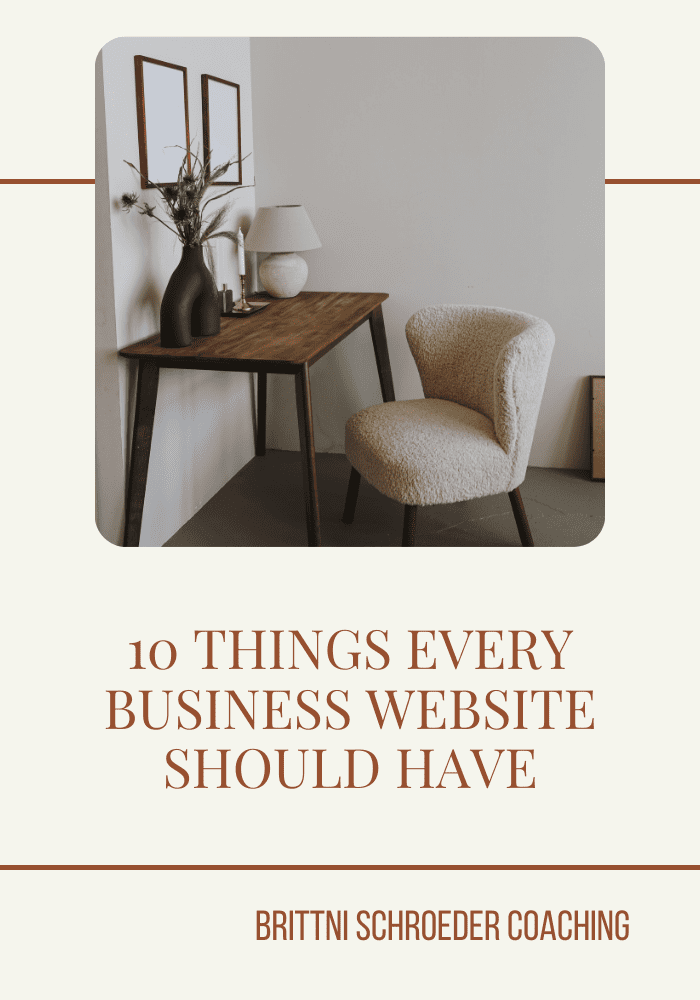brittni schroeder
BLOG
Brittni Schroeder Coaching
10 THINGS EVERY BUSINESS WEBSITE SHOULD HAVE

A potential client is looking for your service or product and they land on your website. This is their first impression of you & your work. Are you assured your website has the power to sell them on your services? If you take time to curate your website, you’re more likely to get the results you are wanting. Here are 10 things every business should incorporate in their website:
FACEBOOK PIXEL
A Facebook pixel is a must-have component. It sounds more complicated than it is, but a Facebook pixel is a snippet of code that you add to your site that automatically tracks your website traffic and visitors. This information helps you learn about the people engaging with your content.
The pixel allows you to run targeted ads to your ideal client. Whether you decide to run ads or not, you’ll still want to install the pixel. It gathers information over time and you will have information from past visitors available to help you create a successful ad campaign.
EMAIL OPT-IN
If you don’t have an email list—get one! Email lists are one of the few things we have complete control over. Make it a priority to consistently grow your email list. Create an enticing email opt-in on your website. You are far more likely to get someone to give you their email if you are offering an awesome freebie in exchange for their email.
Be mindful of your ideal client when creating a freebie. Think of something that will create value for them and leave them wanting more. This could be a checklist, a guide, cheat sheet, e-book, a course, or a worksheet. Whatever it is, make sure your audience will find it useful.
EASY ACCESS TO SOCIAL MEDIA
Social media is a great way to really connect with your audience. By posting both curated and unscripted versions of yourself, you can build the “know, like, and trust” factor with your people. Make it really easy for your website visitors to continue the connection.
The footer of your website is a great place for social media buttons. Make sure that your icons appear on every page of your website. That way no matter what page they land on, visitors can find and follow you easily.
PHOTOS OF YOU
People are loyal to people—not logos. Include at least one picture of yourself on the website. You want people to know you are human and that you exist in the world. This kind of connection helps people put a face with a name. It helps create trust.
The obvious place to put your picture is the About Me section, but try to add a few more images on your website. Especially if you’re a solopreneur or service-based business. Try to push beyond the traditional headshots and incorporate some lifestyle photos showcasing your personality. Hire a photographer to do a branding photoshoot and post those images throughout your website.
GOOD COPY
Use verbiage and copy that speaks to your audience. Try to avoid over using the word “I”. You want your potential client to know that you are there to serve them and to help them get results.
Figure out what they struggle with and offer solutions in your copy. Attempt to speak directly to the audience you are trying to attract. Readers want to know why they should trust you and a big part of that trust is knowing what they are struggling with and how you can help them.
SEARCH ENGINE OPTIMIZATION
SEO is a big part of any online business. SEO will draw the right people to your website. Learn and understand keywords and implement them throughout the copy on your website. Make sure your keywords are authentic and organic. Avoid keyword overuse because people will notice and may be put off. Organic search is our biggest website referral source.
TESTIMONIALS
Having social proof on your website validates your business. Testimonials and reviews are powerful tools to help you secure more clients. I don’t know about you, but I rarely buy a product without reading the reviews first. Testimonials show your audience that you deliver on your promises and that clients love working with you.
Testimonials are one of the most effective tools to build trust. Establishing trust is a necessity for booking clients. If your clients can give you data and numbers, that shows how much you have improved their business.
Place testimonials throughout your website. Add 1-3 on your homepage, service page, and any sales pages. You may also consider dedicating a page specifically for client testimonials.
MOBILE FRIENDLY
A large part of website traffic is viewed mobile devices. Take the time to ensure that your website is optimized for mobile devices. Your website should be user-friendly on mobile devices and easy to navigate. Take the time to resize images and text so they look good on any device and the content can be viewed continuously.
CALL TO ACTION
Always conclude with a call to action. That might be to sign up for your newsletter list, get a hold of you directly, or book your services. Don’t miss out on clients because they don’t know what to do next. In addition to a contact page on your website, include several different options for engagement throughout the site.
Always keep the momentum moving forward with potential clients. However that might translate—whether it’s getting to know you better through social media or signing up for a newsletter—lead them there.
USER FRIENDLY
Create an innovative and creative website but be sure to provide an easy way to navigate and obtain all the information. Try to avoid websites that are overly busy with too much information. Your website should clear and concise.
Avoid long paragraphs, hard-to-read fonts, or complicated navigation menus. When linking resources or calls to action, use words like “click here”. Although there are many dazzling online features available, keep your audience in mind when creating your website. Sometimes less is more.
Does your business website include these 10 essentials? If not, implement them to help you up-level your business! Ensuring that your website serves your audience and demonstrates that you can help your ideal clients get results will significantly improve your business. Take the time to learn, understand, and create an effective website and before you know it, you’ll be turning fans into clients!
.
